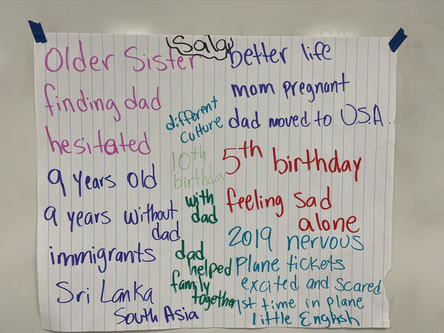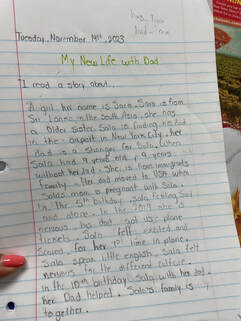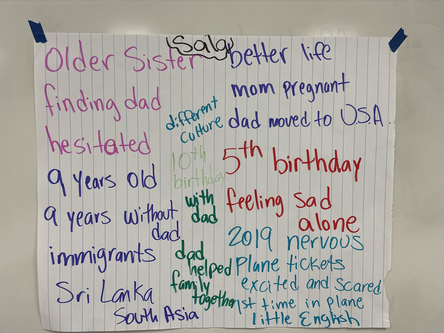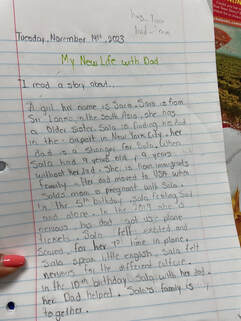|
This is POST #2 of three different posts
Read post #1 (It's not Magic) AND #3 (Editing Writing Process with Newcomer) The Process - Part II
~ "Reading is like breathing in; Writing in like Breathing out" ~ These were the words that helped me understand that the language lessons I provide to my students go hand-in-hand with the language I require them to produce. I understand that my job as an educator is to make my students fall in love with language, words, stories, and imagination. I must maintain classroom walls dripping with language produced by them as a resource as they develop their language domains. I encourage you to read Ms. Allyn's article HERE.
So, with this in mind, here's the next part of the process that led to my newcomers producing the amazing writing I mentioned in Part I. 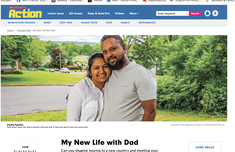
First, I want to state that this was an improvised lesson and planned overnight.
I was in my English II inclusion class when I looked over our Vietnamese newcomer's shoulder who was looking up on Google "What is a summary?" to complete his assignment. I realized that even if he translated the word "summarize" into his home language, he still didn't know the skill. I did not doubt that I had to cover this skill in my newcomers' class. I started the day with our newcomers by having students write their "I can statement" which stated that we were writing a summary. I didn't want to intimidate or discourage students from having to write. I wanted them to feel successful from the beginning. I explained that a summary is just "telling the story in your own words". No grammar complications. Some might say that I need to offer more structure or a more grammatical approach. However, I advise NOT to complicate the process for beginner students. They are in the entering stages of producing language, so we don't want to make them feel that there are too many hurdles to jump through to share our thoughts on writing. In the next lesson, you'll see how editing processes allow room for grammar and more to better their writing. I read the story out loud again, but this time it was the entire story. I had students follow along with me on the screen or in their paper magazines. Once in a while, I'd stop and they would have to say the word I left out. Again, as I'm reading, there's interaction with simple Q&A, hand gestures, body language, sounds, laughter, and excitement. Next, I posted a blank piece of chart paper and told them that to be able to summarize the story, we needed to pull the most important words from the story since we were NOT using the article to summarize it. The list of words we were pulling from the article was about to become the foundation of the events of the story we want to tell in our own words. To keep them engaged and accountable, I had them also write the words on a black piece of paper so they would have them with them. I told them that I was going to read again and STOP at the end of a paragraph to make a list of ONLY the most important words needed to retell important events. I'd circle the paragraph and say, "Tell me what is an important word that can help us make a sentence." - Students would blur out words (some good - some not so good) but I'd validate the words that would go with the events that were essential/important in the story. As a teacher, you must know that there are parts in the text that are not essential to the story. If you take that part out of the story and it doesn't affect/change the meaning/plot of the story, then it's not important. Otherwise, you'd end up with way too many words for students to follow. As students were telling me words, I'd write them on the chart paper until I ran out of room and we got to the end of the story. I tried using a different color marker for each paragraph so they'd remember that it was a different event or paragraph in the story. I pointed to each word and I read them out loud. Then, I had them read them with me. The Challenge
Just because we are wrapping up the semester, and I know with all my heart that they have all received plenty of language scaffoldings and support in my class, I had to challenge them. The challenge was for students to summarize (tell the story in their own words) without Google Translate and the article/magazine.
I wanted to see them using the language they already knew plus the chart with words to create several sentences. I challenged them to tell the story from the beginning to the end. I did allow them to reach out to their partner for light support but not for full help. I told them that if they get to a word they don't know how to say it in English, to NOT get stuck and to use home language to complete the sentence. I wanted them to feel successful and capable and to take risks. I wanted them to see what their limits were and what they were capable of. I gave them a sentence starter that some ended up using and some didn't. Some were successful on the first try some were not. Those who wrote on day one were praised for their amazing work. The ones who I knew could've done better received a chat and a little encouragement on how to complete draft 1. Just so you know, all of my newcomers' writing levels are at a level 1-3 on the WIDA screener, so for them to provide this amount of writing in just a few weeks of instruction is mind-blowing!! Here's Lillian's first draft who while writing came to me probably 5 times asking for a work or two or clarification of her story plot of events as she was retelling. Lillian's WIDA writing score is a 1. This is her first semester in the US and her growth is incredible.
The next day everyone had a first draft written and were able to move on to the next stage of writing - EDITING!
If students wrote a comprehensible summary for draft #1, I gave them full credit. I didn't fix anything because I wanted their peers to look over it before I did.
Read Part III to read how we wrapped our cause-and-effect lessons. If you have any ideas to better these lessons, please leave a comment. I'd love to hear your takeaways and get your input. I'd also like to know how you are encouraging your students to become better writers. Thank you for reading!
0 Comments
Your comment will be posted after it is approved.
Leave a Reply. |
Categories
All
Archives
May 2024
|
